Probe rights abuses, protect civil rights
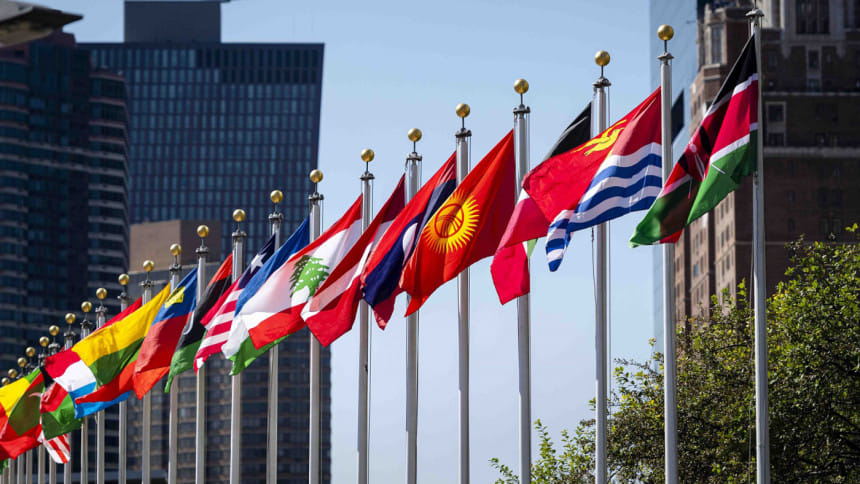
United Nations member states yesterday urged Bangladesh to investigate rights violations by law enforcers, protect civil rights and ensure free and fair trials.
The recommendations were made when the UN's Human Rights Council in Geneva reviewed Bangladesh's human rights situation as part of its four-yearly Universal Periodic Review (UPR).
A delegation from Bangladesh, comprising high officials from the ministries of foreign affairs, law, and Chattogram Hill Tracts affairs and led by Law Minister Anisul Huq, is currently in Geneva.
As part of the recommendations, the US urged Bangladesh to ensure free and fair trials.
"We urge the government to restore transparent and democratic processes, and ensure a safe space for dissenting voices. We recommend that Bangladesh protect the ability of the citizens of Bangladesh to vote and choose their government in a peaceful manner," said the USA representative at the UPR.
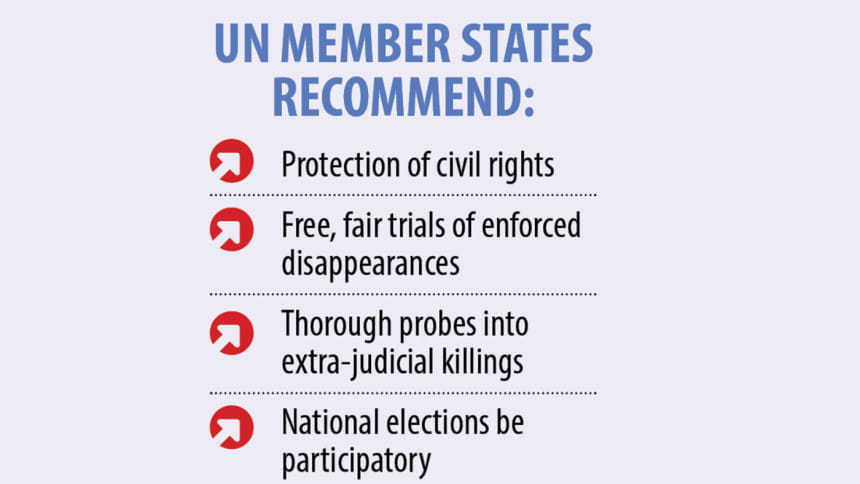
He also asked the government to ensure that journalists, and human and labour rights defenders are not prosecuted for exercising their rights to freedom of expression and peaceful assembly.
Germany echoed the same, asking Bangladesh to ensure all liberties for the people during the upcoming national elections, while Slovakia asked to ensure the polls are participatory.
In response, Law Minister Anisul Huq said holding elections under a caretaker government -- something the opposition has been demanding -- is "completely unconstitutional and illegal".
Meanwhile, the UK recommended that Bangladesh guarantee freedoms of expression and assembly without restrictions.
The US also asked Bangladesh to hold security agencies accountable for human rights violations.
Other countries making the same recommendation include Australia, who said it was "deeply concerned about the extrajudicial executions and enforced disappearances"; Finland, Slovakia and Sierra Leone.
Slovakia asked Bangladesh to thoroughly investigate such violations.
Both Sierra Leone and Finland told Bangladesh to ratify the International Convention for the Protection of All Persons from Enforced Disappearance.
To this, the law minister said that before ratifying more conventions and optional protocols, "we [Bangladesh] are investing in national institutions – particularly to ensure proper implementation of existing mechanisms".
The ratification of this convention, however, has been a long-standing demand. During the last UPR cycle in 2018, eight states had recommended it.
The member states also recommended that Bangladesh do more to ensure freedom of expression and amend or repeal the Cyber Security Act.
Switzerland asked for the Cyber Security Act 2023 to be amended to bring it to line with the International Covenant on Civil and Political Rights, while Sweden asked for laws governing the digital space to conform to international standards.
Australia further asked Bangladesh to safeguard the freedom of expression by amending provisions of the CSA that criminalise free speech.
The Netherlands also expressed concerns at the increased intimidation ofmedia personnel and rights activists.
Slovakia further asked Bangladesh to prevent arbitrary arrests and torture against civil society activists, lawyers and journalists for criticising the government, and to ensure that the press can work without threats, physical assaults and killings.
To this, Anisul said "the use of force has been reasonable, restrained and minimal".
As many as seven member states called on Bangladesh to abolish the death penalty.
Ukraine, Spain, Slovakia and Slovenia asked for the establishment of an official moratorium on the death penalty pending full abolition in Bangladesh.
The law minister responded by saying the death sentence is being phased out.
Prior to the UPR, the government had submitted a report, in which it had reiterated the same, to the UNHRC.
"Bangladesh continues to consider the death sentence to be appropriate for the most heinous crimes. However, Bangladesh is gradually reducing the application of the death penalty with other punishments such as life-imprisonment," the report had said.
Several member states like the Netherlands, Iceland and Australia also told Bangladesh to abolish section-377 of the penal code and decriminalise same-sex relations.
India made recommendations about strengthening the education system and improving the health infrastructure in rural areas, but said nothing about other human rights.
Russia too only recommended that Bangladesh provide equal access to education to women, and that it continues giving importance to human trafficking.

 For all latest news, follow The Daily Star's Google News channel.
For all latest news, follow The Daily Star's Google News channel. 

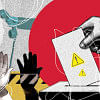
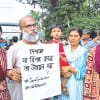

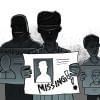

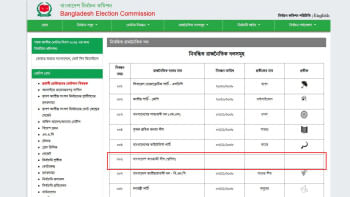
Comments